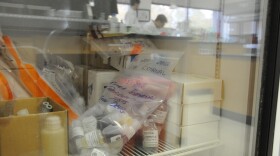We've been looking at the problems in the State Crime Lab this week, particularly the backlog in evidence testing. A group of judges, lawyers, and scientists came together in recent months to suggest solutions for clearing up the backlog, but inside the lab, some efforts are already under way.
The interesting thing is that no one is disputing that there is a big problem. Not the judges, not the researchers, and most importantly not the actual head of the State Crime Lab—who has been very clear about the fact that the agency needs help.
"I will tell you, as the crime lab director, there is no one more discouraged about not being able to give the casework completed in a timely manner and a quality manner back to our customers and stakeholders in the criminal justice system," said John Byrd. "We have this tremendous backlog in the laboratory that has accumulated over a number of years and we are not going to get rid of it overnight as some would have believed."
From the outside, the State Crime Lab looks like any office park in South Raleigh. Nothing about the building makes you think of rows upon rows of evidence, or storage lockers full of guns, or cases of blood samples. But this building handles most of the evidence collected from every crime scene in the state—which equals a tremendous inventory.

But here's the problem: There is so much evidence that comes into this intake center, from over 200 agencies, in all kind of containers, that space is now the real concern.
"I tease that this seems to be a big education area sometimes," said Susie Baker, supervisor of the evidence control unit. "We’ll grab an envelope and say 'This is the ideal size...' and most agencies are pretty good about complying."
While the backlog at the State Crime Lab begins at the evidence control unit, there’s another problem, they simply have trouble staffing the place.
"We only have 124 scientists to cover the 100 counties in the state," said director Byrd.
In 2011 the state General Assembly cut funding for five scientist positions, which just compounded the backlog problem. But that isn’t the only issue—State Crime Lab scientists in North Carolina are paid 16 percent less than the national average.
"This month I lost another scientist to private industry," said Byrd. "He made over $20,000 more than I can pay him here just by walking out the door. That’s my challenge is keeping these kids here."
For the ones who do stay, the work itself is changing pretty quickly too.
Over the years crimes have increasingly been tied to abuse of different types of drugs. It used to be most of the lab testing was to determine blood alcohol, now analysts are looking for all sorts of drugs, a process which takes a lot longer.
"It is a remarkable amount of work," said Anne Hamlin, the forensic scientist manager for drug and toxicology. "With all of the pharmaceutical use that you read about, and the increase in pharmaceutical use— yes it is a lot of work. "
This month I lost another scientist to private industry. He made over $20,000 more than I can pay him here just by walking out the door.
The backlog is not going to be solved overnight. The State Crime Lab is taking small steps, hoping they help. For example, they have reorganized the lab, so evidence has to travel less from intake to testing. That change cuts the number of the steps analysts have to walk by miles.
There are also legislative changes coming.
The General Assembly has approved enough resources for an additional 30 positions, which Director Byrd says should be filled by next March. And there also plans to build a new crime lab in the western part of the state.
"We are in the process, the calvary is coming," said Byrd. "We see the light at the end of the tunnel."
The evidence isn’t going to stop coming in, but maybe now they can stop playing catch up.
>> Ever wonder how the backlog began? Read this story.
















